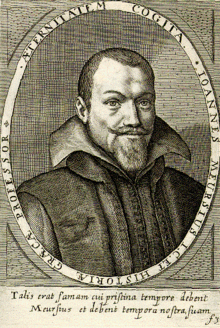- Johannes Meursius
-
Johannes Meursius (van Meurs) (February 9, 1579 – September 20, 1639), Dutch classical scholar and antiquary, was born at Loosduinen, near the Hague.
Contents
Biography
He was extremely precocious, and at the age of sixteen produced a commentary on the Cassandra of Lycophron. In 1610 he was appointed professor of Greek and history at Leiden, and in the following year historiographer to the States-General of the Netherlands. In consequence of the disturbed state of his country during the Eighty Years War, he welcomed the offer (1625) of Christian IV of Denmark to become professor of history and politics at Soro, in Zealand, combined with the office of historiographer royal, in which role he produced a Latin history of Denmark (1630–38), Historia Danica.[1]
Meursius was the author of classical editions and treatises, many of which are printed in J.F. Gronovius's Thesaurus antiquitatum graecarum. Their lack of arrangement detracts from their value, but they are a storehouse of information, and Meursius does not deserve the epithets of "pedant" and "ignoramus" which Joseph Justus Scaliger applied to him. Meursius also wrote on the troubles in the Netherlands.
Meursius also authored the Glossarium graeco-barbarum,[2] one of the first dictionaries of Modern Greek.
Complete edition of his works by J. Lami (1741–1763). See Van der Aa's Biographisch Woordenboek der Nederlanden (1869), and J.E. Sandys, History of Classical Scholarship (1908), ii. 311.
Satyra sotadica
The School of Women first appeared as a work in Latin entitled Aloisiae Sigaeae, Toletanae, Satyra sotadica de arcanis Amoris et Veneris. This manuscript claimed that it was originally written in Spanish by Luisa Sigea de Velasco, an erudite poetess and maid of honor at the court of Lisbon and was then translated into Latin by Jean or Johannes Meursius. The attribution to Sigea was a lie and Meursius was a complete fabrication; the true author was Nicolas Chorier.
Selected works
- 1612: Res Belgicae, Lugduni Batavorum
- 1614: Glossarium graecobarbarum, Lugduni Batavorum
- 1617: Lectiones Atticae, Lugduni Batavorum
- 1625: Athenae Batavae, Lugduni Batavorum
- 1630: Historia Danica, Hafniae
- 1684: Theseus; sive de ejus vita rebusque gestis liber postumus. Accedunt ejusdem Paralipomena de pagis Atticis, et excerpta ex ... Jacobi Sponii Itinerario de iisdem pagis. Ultrajecti: apud Franciscum Halma (On J. F. Gronovius's Thesaurus antiquitatum graecarum)
References
- ^ The influence of Tacitus's Germania on Meursius's history is examined in K. Skovgaard-Petersen, Tacitus and Tacitism in Johannes Meursius’ historia danica (1630–38) (Symbolae Osloenses), 1995; Skovgaard-Petersen sets Meursius and his rival historian Johannes Pontanus (1571—1639) in context; Historiography at the Court of Christian IV, 2002, devoting a chapter to Meursius' career.
- ^ Glossarium graeco-barbarum
 This article incorporates text from a publication now in the public domain: Chisholm, Hugh, ed (1911). "Meursius". Encyclopædia Britannica (11th ed.). Cambridge University Press. http://www.1911encyclopedia.org/Meursius.
This article incorporates text from a publication now in the public domain: Chisholm, Hugh, ed (1911). "Meursius". Encyclopædia Britannica (11th ed.). Cambridge University Press. http://www.1911encyclopedia.org/Meursius.
Further reading
- Heesakkers, C. L. 'Te weinig koren of alleen te veel kaf? Leiden's eerste Noordnederlandse filoloog Joannes Meursius (1579–1639)', in: Miro Fervore. Een bundel lezingen & artikelen over de beoefening van de klassieke wetenschappen in de zeventiende & achttiende eeuw, Leiden 1994, pp. 13–26
- Skovgaard-Petersen, Karen Historiography at the Court of Christian IV (1588–1648): studies in the Latin histories of Denmark by Johannes Pontanus and Johannes Meursius, Copenhagen, 2002
Categories:- 1579 births
- 1639 deaths
- 17th-century Latin-language writers
- Dutch classical scholars
- People from The Hague
Wikimedia Foundation. 2010.

